The late U.S. secretary of state’s association with Biden and the Clintons can be seen as a war-making, mutually absolving clique, writes Sam Husseini.

Diplomatic Security Service conducts a training at the National Cathedral in Washington in 2020. (U.S. State Department)
 It’s fitting that U.S. President Joe Biden and Bill and former Secretary of State Hillary Clinton should eulogize Madeleine Albright at the mammoth Episcopalian institution calling itself the “National Cathedral.”
It’s fitting that U.S. President Joe Biden and Bill and former Secretary of State Hillary Clinton should eulogize Madeleine Albright at the mammoth Episcopalian institution calling itself the “National Cathedral.”
After all, just last year, Albright eulogized fellow war maker, “trailblazer” and fellow Episcopalian Colin Powell there for his “honesty, dignity, loyalty and an unshakable commitment to his calling and word.”
Albright, Biden and the Clintons covered for each other’s criminal war making — and ultimately, they all enabled and covered for Republican criminality as well. All showed they were capable of murderous deceits.
It sparked some measure of attention during the 2020 election, but it’s largely been forgotten that the current sitting president, who with great hypocrisy calls Russian President Vladimir Putin a war criminal, Joe Biden, won’t tell the truth about his Iraq war record — and he hasn’t for years.
Indeed, the death of Albright on March 23 seemed to almost be a case of Providence attempting to interject history into the current geopolitical situation, most obviously the war in Ukraine. But one should not have expected any reckoning to be heard from the podium at the National Cathedral at her funeral on Wednesday. The war planners have had time to prepare their convoluted case.
“Secretary Albright was a trailblazing diplomat” and “a fierce advocate for women” said the Very Rev. Randolph Marshall Hollerith dean of the National Cathedral, echoing the mantra of official Washington.
The “National Cathedral,” like the “Very Reverend,” is actually just branding. The institution is a large Episcopalian church in Washington, D.C., the wealthiest Christian denomination. Albright was on the board. It bills itself as “a house of prayer for all people.” However, Albright’s funeral was “invitation-only.”
An examination of Albright’s tenure as secretary of state highlights extraordinary deceit, how we got to this stage — and what’s been lost as minimal democratic participation has atrophied.
Most obviously, Albright was perhaps the most important advocate for NATO expansion which clearly antagonized Russia and was a major part of the provocation for the invasion of Ukraine. She stood over Clinton as he signed on to NATO enlargement “for stability and security in the 21st century.”
Moreover, the 1999 bombing of Yugoslavia was known as “Albright’s War.” That war was triggered by political fabrications perpetrated by Albright and her associates, particularly regarding the Rambouillet text. It further aggravated Russia and China — whose embassy NATO intentionally bombed at a critical time. It may well have helped ensure the rise of China’s increased militarized posture and the rise of Putin. Further, this first-of-its-kind use of NATO in war in Europe paved the way for its use in Asia (Afghanistan) and Africa (Libya). These moves projected Western military power into each of those continents.

June 1997: General William Crouch escorts U.S. Secretary of State Madeleine Albright to a Black Hawk helicopter for an aerial tour of Sarajevo.(U.S. National Archives)
Albright’s continuation of the sanctions on Iraq, regardless of Iraqi compliance with weapons inspectors, led to a horrific humanitarian disaster in Iraq as well as the collapse of the UNSCOM weapons inspection regime, a complete break against international law and paving the way for the ultimate invasion of Iraq in 2003. In this as well as the Yugoslavia war, Albright was allied with the Clintons and Joe Biden. The sanctions against Iraq also arguably were a major step in the rise of ISIS and proliferation of the use of sanctions which inflicted pain on the civilian populations of other countries such as Iran, Syria and Venezuela.
The rebuff by activists and the general public to Albright’s Iraq agenda, most clearly at a Columbus, Ohio, town hall meeting in 1998, was a stunning short-term victory which followed years of public education about Iraq policy and was the result of focused action of activists on the scene. However, it may have demonstrated to the Establishment that it needed greater mechanisms for use of fear and minimization of actual public debate about issues of war and peace.
The ushering in of President George W. Bush and his vice president, Dick Cheney in 2000 and the 9/11 and anthrax attacks the following year gave the Establishment the mechanisms it needed to use fear and intimidation domestically to oust the government of Saddam Hussein and initiate an era of increased destruction in the Mideast.
NATO Bombing of Yugoslavia
The NATO bombing of Yugoslavia in 1999 struck a major media center, a hospital in Nis and then another in Belgrade. NATO destroyed numerous bridges, including one which was bombed as a civilian train passed over it. The bombing destroyed the electrical grid, released toxic chemicals. It hit columns of refugees and then NATO wouldn’t release information on the bombing.

People crossing the Danube after the destruction in 1999 of three bridges in Novi Sad, in present day Serbia. (Darko Dozet, CC BY-SA 3.0, Wikimedia Commons)
NATO ignored calls for an Easter truce and may have actually escalated its bombing during that period. NATO even hit a number of neighboring countries in the course of its 78-day bombing campaign including Bulgaria and Albania.
Indeed, critics such as David Gibbs, Diana Johnstone, Edward Herman and David Peterson, Robert Hayen and others argued at the time that charges against the Yugoslavian government — Albright claimed it was “genocide” — were wildly exaggerated and were simply a pretext to juice up NATO. Moreover, the NATO bombing actually made the humanitarian situation worse. The stated goals were effectively the opposite of the actual policies.
Perhaps the most notable target was the Chinese embassy. Albright dismissed allegations that the bombing was deliberate as “balderdash.”
A close examination of the timeline of the war indicates that the bombing may not only have been deliberate, but timed for geopolitical effect. Consider:
AFP from April 15, 1999: “China slams NATO strikes on Yugoslavia, calls for end of action”: ” ‘We express our great concern over the humanitarian catastrophe unleashed by the NATO bombs,’ foreign ministry spokesman Sun Yuxi said.”
AFP reported on April 23, 1999, (the day after the U.S. bombing of Radio Television of Serbia): Chinese ramped up criticism of U.S. bombing even more: “NATO stands accused of butchery by Chinese press.”
Just before the embassy was bombed, on May 6, 1999, Japan Economic Newswire reported: “Chinese and Russian diplomatic officials agreed Thursday to take a more cooperative diplomatic stance in trying to stop NATO bombing Yugoslavia.” Sergei Prikhodko, Russia’s deputy chief of the presidential directorate for foreign policy, had flown to Beijing to meet with his Chinese counterparts.
The same day, CNN headlined a story: “Albright: ‘The Russians Have Now Come on Board'” heralding an apparent agreement between the U.S. and Russia. Ralph Begleiter, CNN’s world affairs correspondent, noted however: “It’s not clear at this point what position China might take on the Security Council.”
Copley News Service explained the same day: “Milosevic has insisted that he would only accept an unarmed U.N. presence in Kosovo. The agreement with Russia makes it more likely that the U.N. may now get involved. But significant roadblocks remain, including China’s possible veto of any resolution moving through the Security Council.” (Interestingly, also the same day, a Senate committee approved a major report reviewing technology transfer to China.)
The following day, May 7, NATO bombed the Chinese embassy in Belgrade, the Yugoslavia capital.
After the war, later the same year, the Observer on Oct. 16, 1999, published the investigative piece “NATO bombed Chinese deliberately” which was ignored by the U.S. media.
But neither the Observer piece nor the analysis in the aftermath of it frames the bombing in light of the diplomatic context outlined above.
The Observer piece effectively posits the bombing as was done because the “Chinese embassy was acting as a ‘rebro’ [rebroadcast] station for the Yugoslav army (VJ) after alliance jets had successfully silenced Milosevic’s own transmitters.” In a detailed piece from 2015, China specialist Peter Lee argues that the bombing may have been done to “destroy wreckage of a U.S. stealth fighter shot down over Serbia, which the Milosevic government had delivered to the PRC in gratitude for services rendered.”
Lee argues that the bombing of the embassy marked a major change in China, with many becoming more nationalistic as a result of it and more skeptical of the U.S., especially given the invasion of Iraq which followed.
Such consequences are typically seen as unintended, but there’s no reason to preclude the possibility that they are calculated consequences. The U.S. Establishment seems to crave other countries either to be subservient, or to play the role of designated enemy — justifying its own militaristic stance. These may not always be mutually exclusive.
Did the Yugoslavia War Help Rise of Putin?
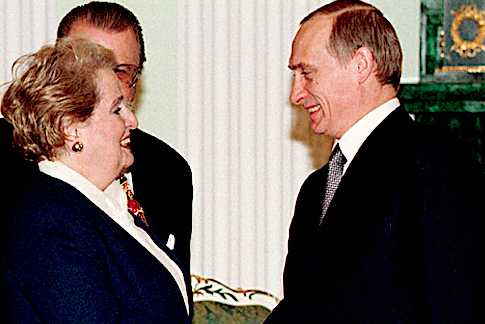
June 1, 1997: Acting President Vladimir Putin shaking hands with U.S. Secretary of State Madeleine Albright ahead of meeting in the Kremlin. (Sergei Velichin, Kremlin.ru, CC BY 4.0, Wikimedia Commons)
While the Establishment narrative in the U.S. seems to bristle at the comparison between the NATO bombing of Yugoslavia and the Russian invasion of Ukraine, they seem strikingly similar in several respects and like mirror images of each other, each justified as an attempt to prevent oppression of an ethnic minority. Such similarities and some differences have been indicated recently by such pieces as “What Is the Difference Between Kosovo & Donbass?” in Consortium News and in a rather defensive manner in Foreign Policy: “Why Putin Keeps Talking About Kosovo.”
But, as with the case of the Chinese embassy, one should examine the timing of events:
NATO bombing of Yugoslavia began on March 24, 1999.

Yugoslav anti-aircraft fire at night. (Darko Dozet, CC BY-SA 3.0, Wikimedia Commons)
On April 9, the Russian president warned:
“I told NATO, the Americans, the Germans: Don’t push us towards military action. Otherwise, there will be a European war for sure and possibly world war.”
But the president wasn’t the despised Putin, it was the U.S. tool Boris Yeltsin.
In fact, the NATO attack on Yugoslavia may have helped Putin’s rise.
Yeltsin appointed Putin to be secretary of the Security Council of the Russian Federation just five days after the start of the NATO bombing — on March 29.
Yeltsin then named Putin prime minister on Aug. 9.
On Dec. 31, 1999, Yeltsin left the presidency earlier than planned and named Putin acting president.
Surely there were other factors, most obviously Yeltsin’s drinking, but it certainly appears that there was a strain of thinking among Russians that they needed someone at the helm who would be able to push back against NATO. Not that such a stance was endemic to Putin, who was frequently quite conciliatory to the U.S. — like his predecessors, he seemed to have been rebuffed when he raised the possibility of Russia itself joining NATO. Particularly after 9/11, Putin seemed to want to make himself quite useful to the U.S. Establishment.
A recent piece published by FAIR, which contains some good information, positively cited media commentary such as The Conversation (3/24/22), which went into detail on Albright’s role in expanding NATO, acknowledging that “Albright’s curt dismissal of Russia’s security concerns might seem to have been ill-judged … in light of Russia’s invasion of Ukraine.”
But “ill-judged” is highly dubious. Many have come to the conclusion that Putin was effectively provoked into the invasion of Ukraine (while not justifying the invasion itself). If that’s true, then isn’t it appropriate to view long-term effects of U.S. policy as part of an effort for that outcome? Viewed in that light, such policies are more diabolical than “ill-judged”.
‘Albright’s War’
A similar dynamic was at play in Albright sparking the Yugoslavia war, at the time called “Albright’s War” by many.
Following Clinton’s impeachment trial, which ended in acquittal by the Senate on Feb. 12, 1999, Clinton was remarkably politically isolated. The war in Yugoslavia, which began the following month, fronted by the first female secretary of state, radically changed the storyline of the administration. It restored, in the depictions of the major media, gravitas and relevance to the Clinton presidency.
The Yugoslavia bombing was largely achieved by the U.S. government inserting Appendix B into the text of the Rambouillet agreement being worked on regarding Yugoslavia. The appendix fundamentally called for NATO to be allowed to occupy all of Yugoslavia: “NATO personnel shall enjoy … free and unrestricted passage and unimpeded access throughout the FRY [Federal Republic of Yugoslavia].”
Thus, the Serbs were effectively forced to reject the text and so Albright and company could depict them as against peace and therefore justify their bombing.

A monument in Belgrade to the children killed in the NATO bombing of Yugoslavia. (Andrija1234567, Wikimedia Commons)
I pulled together a series of news releases attempting to highlight this con at the time and in late April 1999 had a chance to question NATO spokesperson Jamie Shea at the National Press Club regarding the Rambouillet text. (A portion was published by The Washington Post‘s “For the Record” column, which back then was published atop their editorial page. That column, which occasionally printed critical tidbits, was discontinued around 2001.)
Albright insisted that Yugoslavia comply with demands at Rambouillet that basically would have allowed NATO to occupy Yugoslavia.
Later, in June 1999, George Kenney, a former Yugoslavia desk officer at the U.S. State Department, said:
“An unimpeachable press source who regularly travels with Secretary of State Madeleine Albright told [me] that, swearing reporters to deep-background confidentiality at the Rambouillet talks, a senior State Department official had bragged that the United States ‘deliberately set the bar higher than the Serbs could accept.’ The Serbs needed, according to the official, a little bombing to see reason. That was clear in Appendix B of Rambouillet. This war was totally avoidable.”
It was also illegal in a number of ways. In late April of 1999, in a tie vote, the Clinton administration stunningly failed to get an affirmative vote in Congress in favor of the Yugoslavia bombing, leading Michael Ratner and Jules Lobel of the Center for Constitutional Rights to comment:
“It would be a remarkable act of executive hubris and illegal as well to continue the bombing. It is a serious subversion of our constitutional structure (and is impeachable). His only option is to end the aerial bombardment and negotiate a peaceful solution.”
Walter Rockler, a Washington lawyer and a former prosecutor at the Nuremberg War Crimes Trials, said:
“For some to shout ‘war criminal’ at Milosevic only emphasizes that those who live in glass houses should be careful about throwing stones. The Nuremberg Court found that to initiate a war of aggression, as the U.S. has done against Yugoslavia, is not only an international crime, it is the supreme international crime.”
(When I questioned Dan Rather about the absence of a perspective like Rockler’s in the major media later that year, he claimed that, despite the evidence, Rockler “wouldn’t have any trouble getting on the evening news.” When I later shared that with Rockler, he laughed.) These problems have clearly proliferated, with constant claims regarding Iraqi or Serbian or Russian violations of international law, but either silence or justification regarding far worse U.S. government violations.
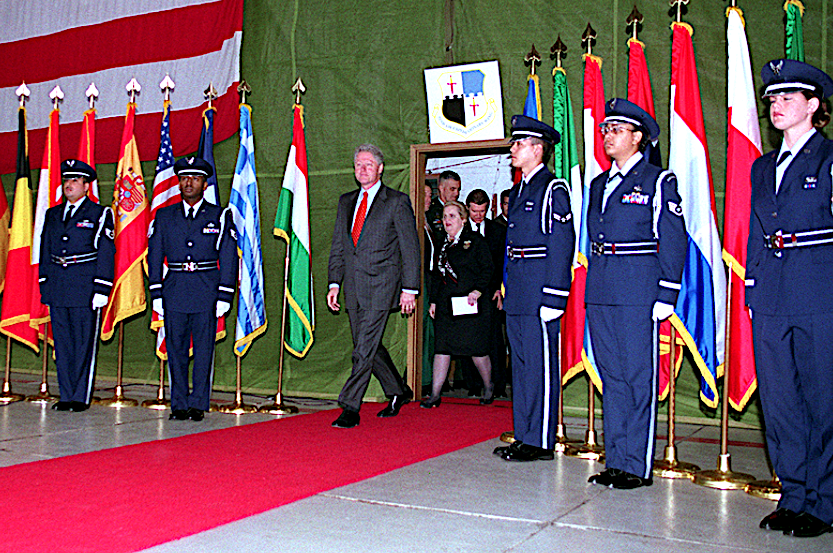
May 5, 1999: U.S. President Bill Clinton, followed by Secretary of State Madeline Albright, at a U.S. air base in Germany to thank the troops for their support in a mission on behalf of Kosovar refugees in Albania and Macedonia. (National Archives)
When Michael Mandel, a law professor at York University in Canada, filed a complaint with the International Criminal Tribunal for the Former Yugoslavia regarding NATO criminality, it was ignored by the court, which was funded by “member states” — including NATO members. A similar fate awaited efforts by the Movement for the Advancement of International Criminal Law and Glen Rangwala, a lawyer based at Cambridge University.
Albright’s anathema to law extended around the world. In contrast to the current massive efforts by Washington to extradite WikiLeaks founder Julian Assange from London to the U.S. for the crime of exposing U.S. government war crimes, Albright in 1998 applied pressure on Britain to let former Chilean dictator Pinochet avoid being extradited for his killings to face a prosecutor in Spain.
She also went above and beyond the usual pro-Israeli stance of successive U.S. governments. Ahron Bregman’s work on aspects of Israeli spying on the U.S. (which is longstanding) showed that Albright promised Benjamin Netanyahu that the U.S. would check with Israel first before offering peace proposals to the Arabs.
“Recognizing the desirability of avoiding putting forward proposals that Israel would consider unsatisfactory,” Albright wrote Netanyahu on Nov. 24, 1998, “the U.S. will conduct a thorough consultation process with Israel in advance with respect to any ideas the U.S. may wish to offer to the parties for their consideration.” This effectively forestalled the possibility of an Israel-Palestinian peace being achieved. Again, the stated goals seem to be the opposite of the actual policies.
Iraq

One of hundreds of Kuwaiti oil fires set by retreating Iraqi forces in 1991. (Jonas Jordan, U.S. Army Corps of Engineers via Wikimedia Commons)
The charge of “genocide” regarding Serbian actions in Kosovo also facilitated the marginalizing of the building charges of genocide regarding U.S. government policy against Iraq.
Denis Halliday and then Hans von Sponeck, both assistant secretaries general of the U.N. who successively became heads of the U.N. oil-for-food program, resigned in protest in succession.
After resigning his position, Halliday toured the U.S., speaking at colleges and churches. The Cornell Chronicle reported in 1999:
“Between 1 million and 1.5 million Iraqis have died from malnutrition or inadequate health care resulting from economic sanctions, said Halliday. The U.N. Security Council imposed economic and military sanctions against Iraq during the Gulf War to prevent that country from rebuilding ‘weapons of mass destruction,’ including nuclear and biological warfare.”
“For me what is tragic, in addition to the tragedy of Iraq itself, is the fact that the United Nations Security Council member states … are maintaining a program of economic sanctions deliberately, knowingly killing thousands of Iraqis each month. And that definition fits genocide,” Halliday said.
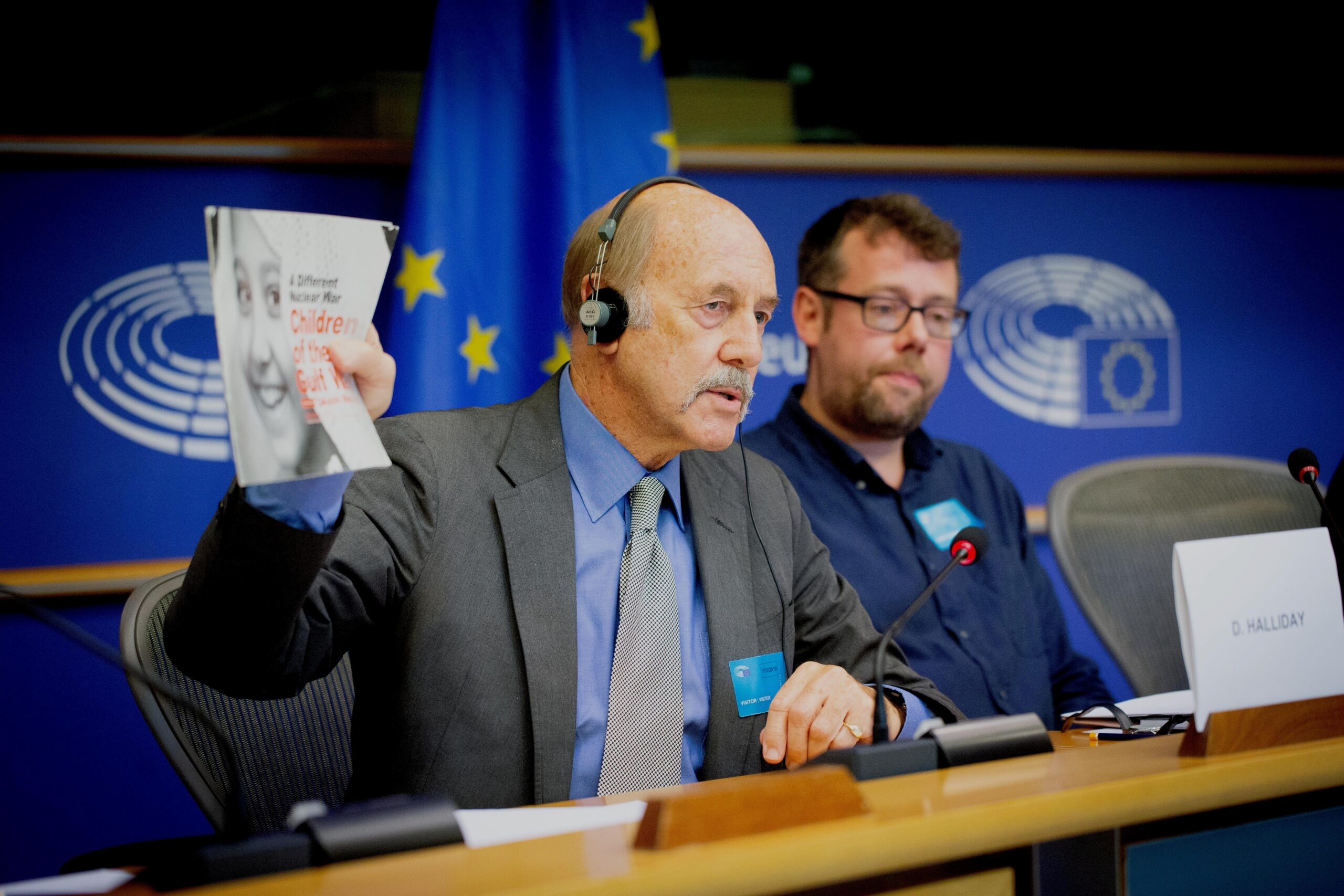
Denis Halliday, former U.N. assistant secretary general and 1997/98 U.N. humanitarian coordinator in Iraq, speaking on nuclear disarmament in 2019. (GUE/NGL, CC BY-SA 2.0, Wikimedia Commons)
Especially under-appreciated is the extent to which the devastation of the sanctions led to the radicalization of Iraq.
Late in 1998, Halliday warned that the long-term U.S. policies and social strains of bombings and sanctions threatened the rise of a “Taliban-type” movement in Iraq — in effect foreseeing the rise of ISIS years before the 2003 invasion.
As many have noted, Albright infamously said in 1996 on 60 Minutes that the price of half a million dead children was “worth it.” But that statement didn’t hurt her career in any way — she got promoted from U.N. ambassador to secretary of state the following year. And while many remember her for that remark now, it barely registered at the time in U.S. media. Albright has claimed in recent years “I regret it. I have apologized for it I can’t tell you how many times.” But it’s quite clear, what she regrets is so openly stating how murderous U.S. policy was.
When I asked her about it in May of 1998 at the National Press Club, she claimed “I do not actually remember saying that specifically.” When I responded that I’d seen it, she argued the suffering of Iraqis was all Saddam Hussein’s fault — “you can’t lay that guilt trip on me.” My attempt at follow-up “You don’t think the U.S. has any culpability ….” was cut off.
In fact, the sanctions were kept in place by a series of deceitful U.S. policies, as I outlined in a detailed timeline in November 1998.
Just after Albright became secretary of state in January 1997, she went to Rice University in early February where she spoke about bipartisanship. She was warmly introduced by George H. W. Bush’s secretary of state, James Baker, who in 1991 set the original policy of perpetual sanctions against Iraq. In 1991, he said: “We are not interested in seeing a relaxation of sanctions as long as Saddam Hussein is in power.”
The first time I saw Albright was at Georgetown in March of 1997, when she gave what I believe is her first speech in Washington, D.C., as secretary of state. It basically adopted Baker’s stance. She sought to “reaffirm United States policy towards Iraq” — meaning that the sanctions placed on Iraq would continue even if Iraq completely disarmed.

Tile painting of Saddam Hussein at the Imperial War Museum. (Matt Buck/Flickr)
The U.S. public was led to believe that if only Saddam Hussein abided by the dictates of the U.N. Security Council and disarmed, then all would be well. In fact, the U.S. government basically insisted that the horrific sanctions continue regardless. As Albright said at that speech: Iraq “must recognize its border with Kuwait, return stolen property, account for POW/MIAs, end support for terrorism and stop brutalizing its people.”
This violated the U.N. resolutions. On April 3, 1991, the U.N. Security Council passed Resolution 687 which states that upon “the completion by Iraq of all actions contemplated in” specific paragraphs of the resolution, “the prohibitions against financial transactions … shall have no further force or effect.” The paragraphs cited have to do with weapons inspections. Other paragraphs in the resolution have to do with “return of all Kuwaiti property seized by Iraq” and Iraqi liability for losses and damage resulting from Iraq’s occupation of Kuwait.
While U.N. ambassador, Albright told a Senate Foreign Relations subcommittee that sanctions must continue against Iraq in part because Baghdad was allegedly continuing to repress the Kurds. But Vera Beaudin Saeedpour of the Kurdish Library questioned “Unsubstantiated claims that Saddam Hussein is behind virtually every incident, when local vendettas and the power struggle between Massoud Barzani and Jalal Talabani account for most, are simply accepted.”
Still Albright stated:
“We do not agree with the nations who argue that if Iraq complies with its obligations concerning weapons of mass destruction, sanctions should be lifted. Our view, which is unshakable, is that Iraq must prove its peaceful intentions. It can only do that by complying with all of the Security Council resolutions to which it is subjected. Is it possible to conceive of such a government under Saddam Hussein? When I was a professor, I taught that you have to consider all possibilities. As Secretary of State, I have to deal in the realm of reality and probability. And the evidence is overwhelming that Saddam Hussein’s intentions will never be peaceful.”
So, Iraq had an impossible standard. It had to show the U.S. it had peaceful intentions. Did the U.S. government have peaceful intentions?
This U.S. policy gave the Iraqis a disincentive to cooperate with the weapons inspectors. Andrew Cockburn later reported that Rolf Ekeus, then head of UNSCOM, the U.N. inspection group, understood immediately what Albright intended. “I knew that Saddam would now feel that there was no point in his cooperating with us, and that was the intent of her speech.” Sure enough, the following day he got an angry call from Tariq Aziz, Saddam’s deputy prime minister and emissary to the outside world. “He wanted to know why Iraq should work with us any more.”
Thus, it seems almost certain that the point of U.S. policy was exactly the opposite of what it claims. It was actually to keep the sanctions in place till Saddam Hussein was ousted. This also virtually destroyed the possibility of Iraqi compliance. (Additionally, The Washington Postwould report that the U.S. used UNSCOM as spies against Iraq.)
However, when she came before the public, Albright would deceive and claim that if only Saddam disarmed all would be well. For example, on the PBS NewsHour in 1998, she was asked:
“Now, as you know, Tariq Aziz, the deputy prime minister of Iraq, had a press conference today, and he essentially blamed the United States for the standoff. He said they’ve been trying to cooperate for seven and a half years. There’s never any light at the end of the tunnel; there’s just another tunnel, and that the Clinton administration, as he put it, just doesn’t want to see sanctions lifted, period.”
Albright in her response pretended that it was just about disarmament, lecturing the Iraqis:
“Well, you know, it’s quite typical of the way that they’ve been operating. They will not accept responsibility themselves for what is going on. They are the ones that have had the opportunity since the end of the Gulf War to comply. You know, this has been one of the clearest sanctions regimes with the clearest road maps that have ever existed in terms of how to get from Point A to Point B, and it’s perfectly simple for them to say that UNSCOM needs to come in and do its job.”
Again, see timeline from 1998: “Autopsy Of A Disaster: The U.S. Sanctions Policy On Iraq.”
(The Intercept recently argued some figures of Iraq dead were inflated, citing a 2017 piece in The British Medical Journal. But that piece should be viewed carefully. The language it employed denouncing Iraq’s alleged “spectacular lie” regarding the effect of the sanctions seems unusual for an academic journal article. And, ironically, in its third sentence, the article bought into the central myth of the sanctions, claiming: “their removal required that Iraq should destroy its weapons of mass destruction.” But The Intercept itself acknowledged that that was not the actual U.S. policy, that the sanctions would — and did — continue even after Iraq destroyed all such weapons.)
The war moves against Iraq were also tied to Clinton’s political fortunes.
On Jan. 21, 1998, some papers ran small articles about a letter 54 U.S. bishops had sent to President Clinton expressing their profound moral concerns about the U.S.-led sanctions against the people of Iraq. Later that day, however, the Monica Lewinsky story broke, proving that the media know a real morality tale when they see one.
Albright and the rest of the Clinton administration failed in their apparent designs to attack Iraq following the Ohio State town hall on Feb. 20, 1998. In August, Albright proclaimed:
“Let me … make clear that if necessary we will use force on our timetable in response to threats, and at a time and place of our choosing.”
That time and place turned out to be just as Clinton was being impeached in December 1998. That “Desert Fox” bombing of Iraq also coincided with Ramadan.
This was an expansion of the bombings of August of 1998, as Monica Lewinsky was testifying before a grand jury, Clinton bombed Afghanistan and a pharmaceutical plant in the Sudan. Albright and National Security Advisor Sandy Berger would attempt to justify the Sudan bombing while producing no evidence of a “pharmaceutical company that produces precursors for chemical — the possibilities of chemical weapons.” She and Clinton were backed to the max by Biden.
The New York Times would later debunk many claims about the Sudan bombing, reporting on sources who said Albright “encouraged State Department intelligence analysts to kill a report being drafted that said the bombing was not justified.” This was an apparent precursor for Cheney rigging the case for the invasion of Iraq, with intelligence being politicized.
And the WMD scaremongering of the Bush/Cheney years was pioneered largely by Albright and company. On Nov. 16, 1997, William Cohen, who headed the Pentagon while Albright was in office, went on ABC’s “This Week” armed with a prop:
“Anthrax, if you took a five-pound bag of sugar and accept — call this Anthrax [Cohen holds up a bag of sugar]. This amount of Anthrax could be spread over a city — let’s say the size of Washington. It would destroy at least half the population of that city. … One of the things we found with Anthrax is that one breath and you are likely to face death within five days. One small particle of Anthrax would produce death within five days. VX is a nerve agent. One drop from this particular thimble as such — one single drop will kill you within a few minutes.”
This was mocked by Maureen Dowd: “Anthrax, Shmanthrax.”
Cokie Roberts told Cohen on ABC: “Would you put that bag down please.”
In August of 1998, chief weapons inspector Scott Ritter resigned from his position at UNSCOM, objecting to Albright’s apparent hindering of the inspections for a time. He claimed that Iraq was conning the U.S. and would be able to re-constitute its WMDs within six months. But he was, from his own hyper-militaristic perspective, realizing the contradictions of U.S. policy — that disarmament of Iraq was not the actual goal.
This is something right-wingers, militarists and “realists” sometimes do: They critique U.S. policy while assuming that the stated goals are the actual goals, they point to contradictions and then dubiously conclude that some foreign enemy is bamboozling the administration. Frequently, they are ignoring the actual Machiavellian nature of U.S. policy. Usually this is functional at some level, but in this case, the Establishment could not tolerate Ritter’s criticism and so he started losing his golden boy media stature.
When he testified before Congress, it was Biden who took the lead against Ritter, slapped him down, stating that he was operating “above your pay grade” in questioning Albright. Ironically, Albright stated that Ritter “doesn’t have a clue about what our overall policy has been.” Indeed, by 1999, Ritter had shifted his statements, telling Frontline that the U.S. would keep the sanctions in place no matter what Iraq did and that it was thus responsible for the death of UNSCOM.
But that clear fact would be obscured by the major media. Falsified in fact. Over and over again. On Dec. 19, 1999, Tim Russert (who also had his funeral at the “National Cathedral”) helped Albright’s case by outflanking her with a falsehood:
“One year ago Saddam Hussein threw out all the inspectors who could find his chemical or nuclear capability — one year. He now said just yesterday, ‘You’re not coming back.’ When is the administration going to get in there and start inspecting?”
However, Iraq did not throw out the weapons inspectors; Richard Butler, the head of UNSCOM withdrew them after submitting a contradictory report that, according to The Washington Post, the U.S. government had a hand in drafting. The myth that UNSCOM had ended because Iraq had kicked out the inspectors became a huge media myth in the years before the 2003 invasion of Iraq and helped facilitate it.
The trap that Albright and company put Saddam Hussein in virtually compelled him to throw out the weapons inspectors periodically. He did so at times that were inconvenient to the U.S. and its Israeli and Saudi allies. Then, he would let the inspectors back in since not doing so would give them an opening to attack him at some point thereafter. This was depicted in the U.S. media as a game of “cheat and retreat” on the part of Hussein, but it was actually the result of the U.S. policy of maintaining the crippling sanctions regardless of Iraq’s actions. Iraq wanted there to be a path to lifting the sanctions and the U.S. refused, so it eventually killed UNSCOM.
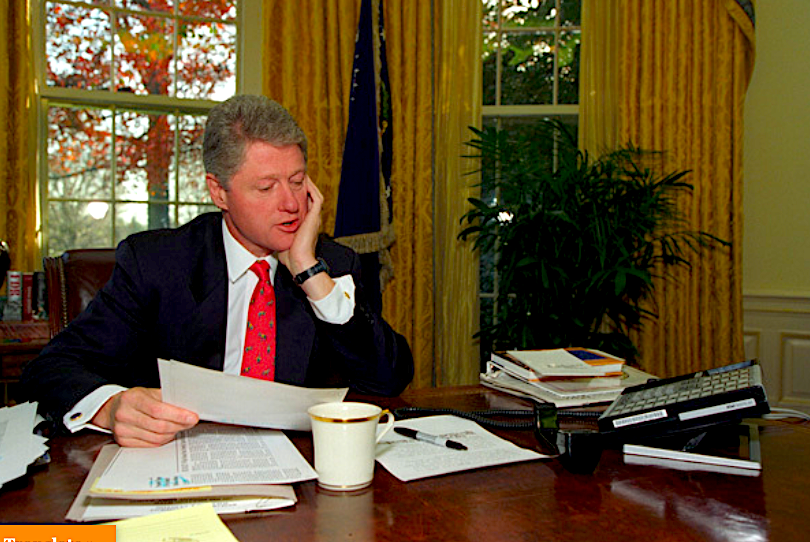
President Bill Clinton on speakerphone in the Oval Office, Nov. 22, 1993. (U.S. National Archives)
Clinton ultimately owed the salvaging of his presidency to his fervent embrace of war in the person of Albright. But bending to the agenda of the Establishment was displayed at the birth of the administration as well when he was undermined by his first secretary of state, Warren Christopher.
On Jan. 13, 1993, a week before he was about to take office and with George H. W. Bush engaging in another bombing of Iraq, Clinton stated blasphemy:
“I am a Baptist. I believe in death-bed conversions. If he [Hussein] wants a different relationship with the United States and the United Nations, all he has to do is change his behavior.”
The following day, in the face of criticism, particularly from The New York Times, that he might lift sanctions and even normalize relations with Iraq, Clinton backtracked: “There is no difference between my policy and the policy of the present Administration…. I have no intention of normalizing relations with him.”
Clinton was also remarkably undermined by Christopher who said: “I find it hard to share the Baptist belief in redemption.” The Methodist Christopher added: “I see no substantial change in the position and continuing total support for what the [Bush] administration has done.” That policy doomed Iraq to a decade of starvation and a seemingly inevitable ultimate invasion.
Albright’s Legacy
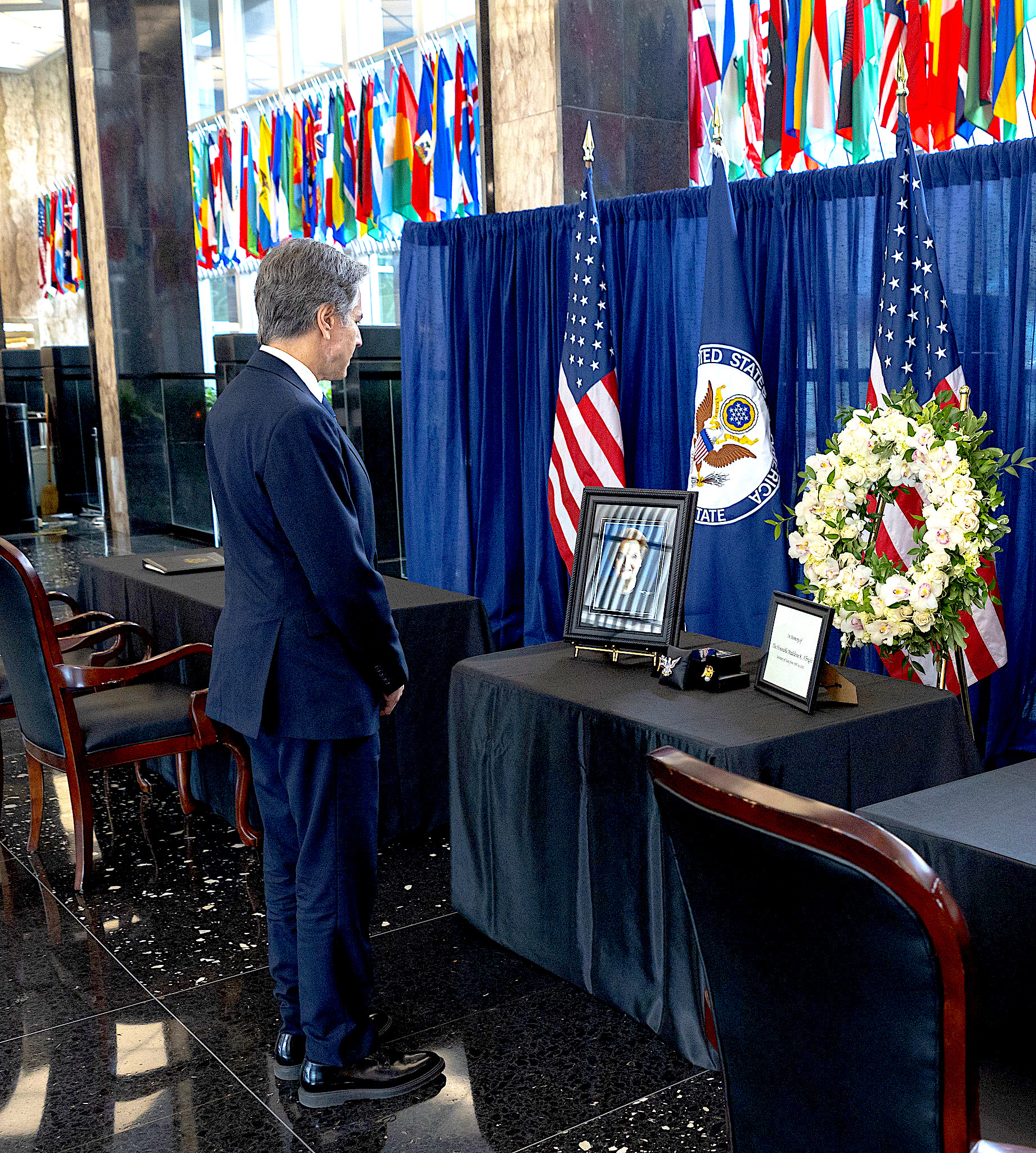
U.S. Secretary of State Antony Blinken visits memorial in honor of Madeleine Albright, first female secretary of state, on March 31. (State Department, Freddie Everett)
Secretary of State Anthony Blinken said of Albright: “She’s a role model for me & so many of our diplomats.” Indeed.
After she was secretary of state, Albright was chair of the Albright Stonebridge Group, described by the Revolving Door Project as “a secretive shadow lobbying firm … [working on] behalf of foreign governments like the UAE and Saudi Arabia, whose U.S.-backed military intervention in Yemen has caused a humanitarian disaster.”
Other clients include Amazon, Microsoft, Pfizer, Merck, Black & Veatch. It has been home to Victoria Nuland, now under secretary of state for political affairs, who infamously blurted “Fuck the EU” while planning out the 2014 Ukrainian coup; Wendy Sherman, now deputy secretary of state; current Ambassador to the UN Linda Thomas Greenfield (who has been shielding Saudi Arabia at the U.N. as it brutalizes Yemen) as well as less visible people like Mark Feierstein, a top Democratic Party fundraiser who repeatedly urged the Trump administration to remove Nicolas Maduro from power in Venezuela and is now principle adviser to USAID, which effectively functions as a soft-power CIA.
In addition, last year, Biden appointed one of her daughters, Alice P. Albright, to head the Millennium Challenge Corporation, set up by George W. Bush to dispense funds to countries deemed to be pursuing policies of “economic growth.”
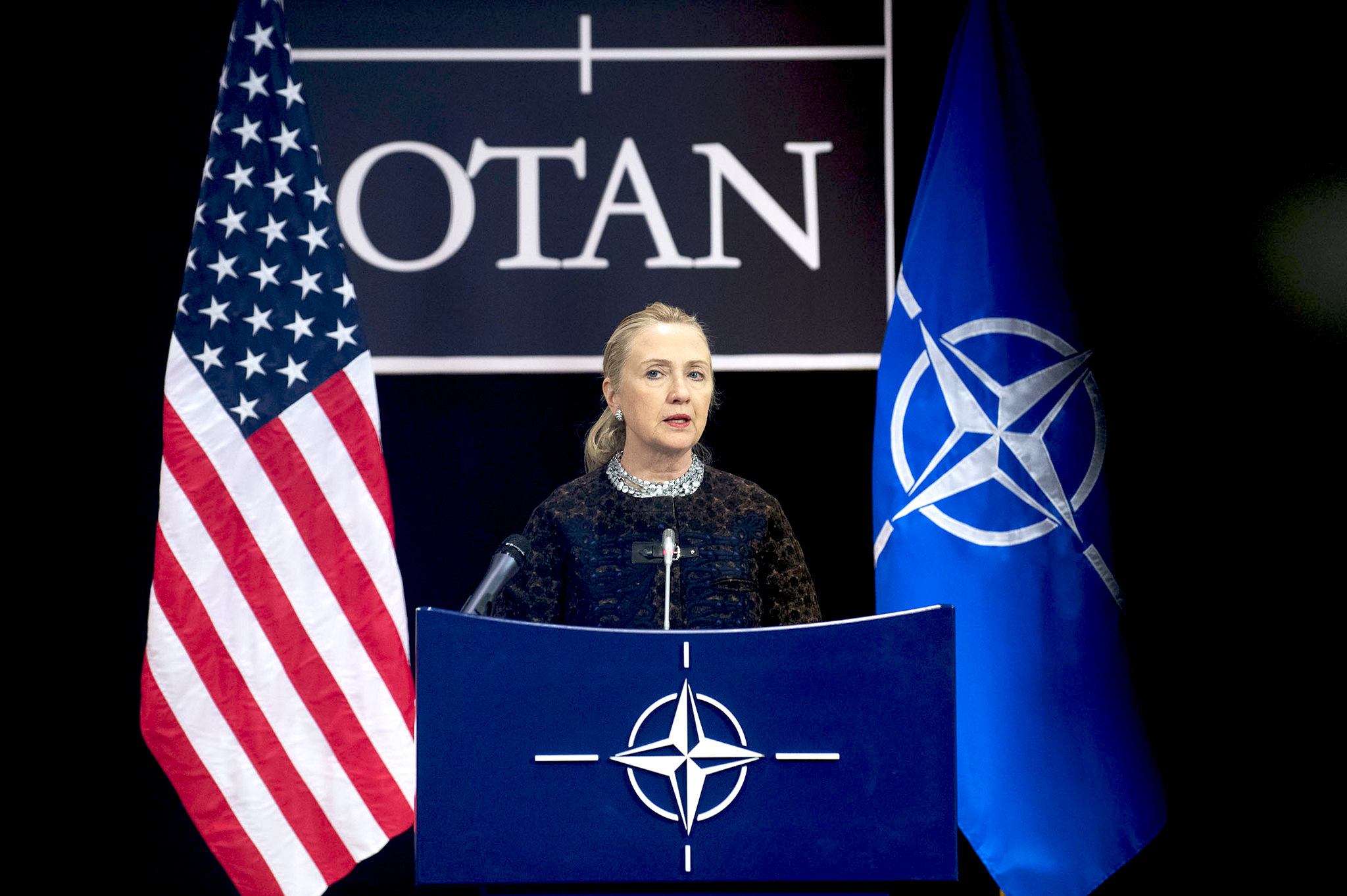
Dec. 5, 2012: Secretary of State Hillary Clinton at a NATO foreign affairs meeting. (NATO)
Perhaps even more importantly, Albright’s tenure as secretary of state was a major step in having a woman in a major office with no substantial challenge to the modalities of Empire. This would be repeated 10 years later with Hillary Clinton as secretary of state and with respect to ethnicity, with Barack Obama as president.
Having women and ethnic minorities in particular positions could be quite strategic, as when feminism becomes a pretext for empire when the Taliban are targeted.
Indeed, Albright being a female as Clinton was in the midst of his sex scandals facilitated war being the answer for both what the Establishment wanted and what helped Clinton politically. As Martin Luther King would worry: “I’ve come to believe we’re integrating into a burning house.” Or at least a house that burns other houses.
This was part of the dynamic of using Eastern Europeans as a tool against Russia. Albright’s own mentor, National Security Advisor Zbigniew Brzezinski, would boast about President Jimmy Carter signing the first directive for secret aid to forces in Afghanistan fighting the Soviet-backed government on July 3, 1979:
“And that very day, I wrote a note to the president in which I explained to him that in my opinion this aid was going to induce a Soviet military intervention.”
That invasion came in December 1979. This has parallels to Albright’s actions regarding triggering the bombing of Yugoslavia and current actions regarding provoking the war in Ukraine.
Albright was part of Brzezinski’s National Security Council and would focus on Poland (where Brzezinski was born) when she left there. Ronald Reagan and Charlie Wilson would get the “credit” for backing the fighters in Afghanistan as the war dragged on, but the origin was Brzezinski.
Albright’s family — her Jewish heritage was only made public after she became secretary of state — was apparently saved in Serbia, yet when confronted by Serbian activists years after the bombing of Serbia that she presided over, she shouted at them: “Disgusting Serbs! Get out!“
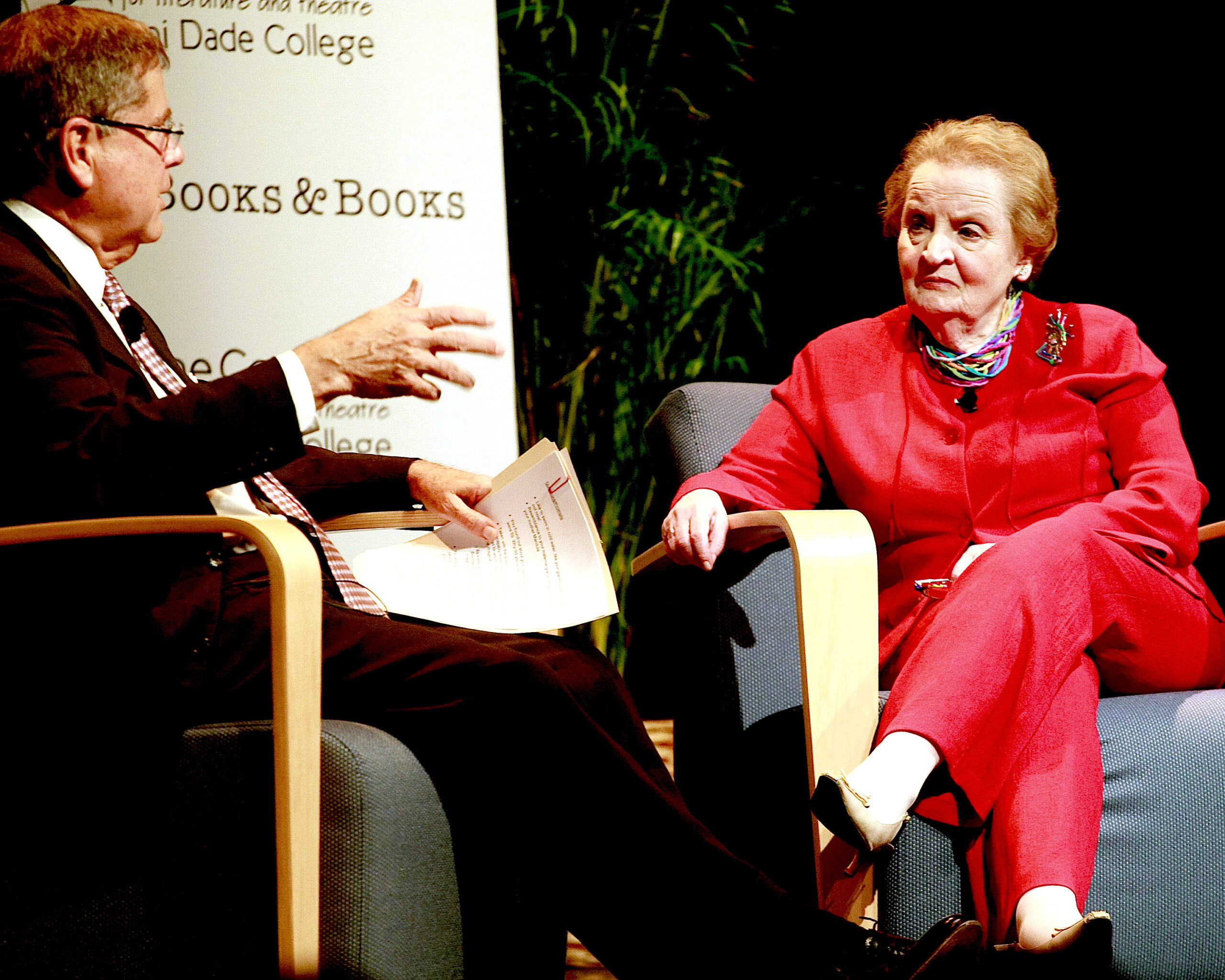
Madeleine Albright in 2012, during an interview about her book “Prague Winter: A Personal Story of Remembrance and War, 1937-1948.” (Knight Foundation, Wikimedia Commons)
In 1997, Brzezinski effectively called for the breakup of Russia, or at least its decentralization, writing:
“A loosely confederated Russia — composed of a European Russia, a Siberian Republic, and a Far Eastern Republic — would also find it easier to cultivate closer economic relations with its neighbors. Each of the confederated entities would be able to tap its local creative potential, stifled for centuries by Moscow’s heavy bureaucratic hand. In turn, a decentralized Russia would be less susceptible to imperial mobilization.”
Public Revulsion
In May 2000, as Albright gave commencement addresses, the public revulsion was palpable. At University of California, Berkeley, university medalist Fadia Rafeedie gave a speech following Albright’s which denounced her policies at Berkley. When Albright was faced with protests at Northwestern, she canceled.
Much of the groundwork for this activism on the sanctions had been laid by Rania Masri, a determined Arab American activist based in North Carolina who gave countless talks to small groups around the U.S. The group Voices in the Wilderness, later called Voices for Creative Nonviolence, openly violated the sanctions, sending food and medicine to Iraq and was relentlessly hounded by the U.S. Treasury Department. Mike Zmolek and others formed the National Network to End the War Against Iraq.
At George Washington University, students turned their back on Albright. One attractive young woman held up a “Criminal Of War” signed with the capitalized letters lined up. I thought it was a low blow, but I confess to having laughed. Now, I wonder how much of this type of abuse that Alright took may have further hardened her heart to do the awful things she did.
One professor at GW walked off the stage. Tom Nagy, a professor of expert systems, had been researching U.S. policy on the sanctions against Iraq. The following year, his piece “The Secret Behind the Sanctions: How the U.S. Intentionally Destroyed Iraq’s Water Supply” would be published in The Progressive.
He uncovered documents such as the Air Force’s Doctrine Document 2-1.2 of May 1998 entitled “Strategic Attack,” which includes an analysis of Desert Storm: “The loss of electricity shut down the capital’s water treatment plants and led to a public health crisis from raw sewage dumped in the Tigris River.” This was under the section entitled “Elements of Effective Operations.” Disgusted, Nagy would move to Canada.
By early 2000, you had even the Democratic Minority Whip David E. Bonior, D-Mich., calling the sanctions “infanticide masquerading as policy” and the AP reporting the “United Nations’ Children’s Emergency Fund said several thousand children under the age of five die each month from malnutrition in Iraq.”
Activists protested in front of the studios of the Sunday morning chat shows. Albright would sneak into the studio at ABC through the back garage entrance.
Ohio State: An American Intifada on CNN
A high point was the Ohio Town hall meeting. Albright, Cohen and Berger were sent to the Ohio State University in an apparent attempt to convince the U.S. public to go along with an attack on Iraq.
You may have seen a clip of Jon Strange questioning Albright about the duplicities of U.S. policy, but that was only part of it.
Here's an Ohio State student back in 1998 asking Madeleine Albright why the U.S. bombs Iraq, yet sells weapons to Israel.
Madeleine Albright's disgusted face says it all… so she proceeds to accuse the students of defending Saddam Hussein. pic.twitter.com/DhogY21Y9x
— Faran Balanced (@FaranBalanced) March 24, 2022
Remarkably, I’ve been unable to get a full transcript or video of the infamous town hall meeting, which says volumes about what information is retained and what’s lost in our society. A seven-minute clip is here.
Jon Strange’s role was just the most evident since he was wearing a tie and got to speak at the mic. A series of activists on the ground, including Riad Bahhur, Claudio Fogu and TJ Ghose and many others made that remarkable event happen. Their heroics are a story that needs to be told in detail. As I wrote shortly thereafter in “Short-Circuiting the Media/Policy Machine” for MERIP, a seemingly inevitable attack on Iraq was headed off in early 1998 by a combination of protests and tough questions from Ohio and UN Secretary General Kofi Annan flying to Baghdad.
For a time, it looked as though U.S. activism and global pressures could stop the designs of the U.S. Establishment. This pattern would effectively be repeated with the WTO meeting “Battle in Seattle” the following year, with U.S. activists facing tear gas in the streets and representatives from around the world refusing to sign on to the WTO’s economic demands.
This dynamic slowed with the incoming Bush administration and came to a screeching halt with the 9/11 attacks and false-flag biowarfare anthrax attacks in 2001 which were used by the U.S. Establishment to clamp down on civil liberties and launch massive invasions that are effectively continuing. The U.S. public was brought into a space of total fear, media propaganda went into overdrive and forces for positive change were largely weakened, silenced, isolated or co-opted.
The Cross & the Sword
The “National Cathedral” is also where George W. Bush gave his first major speech after getting back to Washington, D.C., after 9/11. Whatever “progressive” crumbs the institution may presume to foster, the shape and manner it is used for on the national stage make it an enabler of empire; a prop for the pomp and circumstance of war criminals celebrating each other. This national stage is used to prey on the natural empathy people have for the deceased while ignoring the killings the officials have perpetrated and purging any critics from the hall.
The original plans for Washington, D.C., by Pierre Charles L’Enfant made provision for “a great church for national purposes,” but because of concerns about church-state separation, nothing came of the idea. The current “National Cathedral” is simply the seat of the presiding bishop of the Episcopal Church in the United States. It’s a “National Cathedral” like the singer Madonna is the mother of Jesus Christ.
The late Blase Bonpane, a former Maryknoll priest, warned of how centuries ago, imperial theology was born. “The sword and the cross came together in building empires.” That insidious process continues to this day in Washington, D.C.
Sam Husseini is an independent journalist based near D.C. He is on Twitter: @samhusseini.
This article is from the author’s Substack.
The views expressed are solely those of the author and may or may not reflect those of Consortium News.

Thank you, excellent – a great contribution to truth. I’m a cynic and this article piled on fact after fact of US imperialism and the killing of innocents. It demonstrates both the crimes of individuals and governments in a world which continues to be over-populated with all the competition for commodities and space. And of course affecting the planet in negatively in large scale environmental areas. This of course will lead to constant competition and warfare. I’m not sure how our species will make out in the long run. We will need to find real leaders who can face reality and educate the public in regard to the need for better international organizations for cooperation. And we must shed many of our myths and continue building independent news organizations who are not just “manufacturing consent.”
“When fascism comes to America, it will be wrapped in the flag and carrying a cross.” Sinclair Lewis
It is this deification and blatant hypocrisy of the Episcopal Church that drove me from their ranks after several decades of membership. John McCain, George HW, Powell, Albright–it is sickening. That and my own personal run in with my own diocese in their “investments” which included all manner of evil corporate holdings. When as a trustee myself, I challenged them, the response (with the “progressive” Bishop in the room and silent) was, “We have fiduciary responsibility to maintain.” I resigned in protest, and have walked away from the entire lot who purport to “live the Gospel” and yet make no effort to get the plank from their own eye. The sermon on the mount chucked aside for their ego investment in American culture.
Oh, how I wish all the uninformed Albright admirers who can’t look past the feminist accomplishment as the first woman Secretary of State would read this outstanding post by Mr. Husseini. As is the case with every US official, her own words condemn her, “They will not accept responsibility themselves for what is going on.” When it comes to America’s role in the evils of this world, never was a truer word spoken.
When Michael Moore promoted his anti-Bush Jr., anti-Iraq invasion film “Fahrenheit 911” in Toronto,
a large crowd attended his speech in the largest hall on the University of Toronto campus.
In the question period, activists announced a demonstration a few days later against
the war criminal Madeleine Albright, who was to give a speech to a well-heeled audience
(in a series of talks by ‘women breaking glass ceilings,’ wouldn’t you know).
To the surprise of many, Moore — who had spent half an hour or so decrying the crimes
of Bush, Cheney, et. al. and calling for punishment — demurred, saying (more or less)
‘it’s in the past; let bygones be bygones.’ The limits of ‘liberalism,’ I suppose.
“When Michael Mandel, a law professor at York University in Canada,
filed a complaint with the International Criminal Tribunal for the Former
Yugoslavia regarding NATO criminality, it was ignored by the court”
Among the tribunal judges who ignored the complaint was Louise Arbour,
a former Canadian Supreme Court judge much lauded as a human rights
defender — in mainstream media, of course.
Re: the sword and the cross. Another reason that religion should by now have been made redundant. Rank superstition needs to be replaced by science. Now, in the 21st century, to see people clinging to religion (and here I particularly emphasize Christianity) reminds us that governments have not emerged from the Dark Ages and in fact are working to take the world back there. Albright was a war criminal. A vicious, conscienceless piece of political filth who belonged on the bottom of the shoe of civilized people. And I’m restraining myself here. Along with other monsters, like Margaret Thatcher, the world is better off without her.
Criticism of US foreign policy, Albright smeared people as supporting “Saddam Hussein” etc. Criticize Israel: you are an Anti-Semite, criticize unilateral illegal sanctions “you are a Trump/Putinista… blah blah blah. Notice how highly educated people just blow off legitimate, fact-based questions with name-calling and smears? That alone should raise red flags. They know they don’t have an argument, so they (like children) start name-calling.
Then there is the Gross Hypocrisy Inc.: US foreign policy is often based on ILLEGAL actions. The US regularly ignores legally-binding agreements and treaties. (UN Charter, Geneva Conventions, treaties with American Indians etc.). and yet uses international law as a hollow excuse to commit more crimes. The Rule of Law Inc. applies “only to the little people” not for the Imperial Overlords and the Oligarchy. (Look at the Chevron/Donziger case for example).
The US and EU vassals always bandy about Orwellian phrases like “rules based order” “the rule of law”, “democracy”. For me, this has become a sarcastic joke. The illegal actions, crimes against humanity, and war crimes are too many to list here, and many books have been written about this.
Speaking of Zbig, B.: Ukraine is a pawn in the Grand Chessboard to “pry away” Ukraine from Russia. The end game (Rand Corp. Atlantic Council, CFR et al.) is to destroy Russia and prevent a Eurasian power from dominating the “heartland” (Halford Mackinder)
Since Putin won’t cooperate, he must be demonized, as The New Devil. Saddam Hussein, Muammar Gaddafi, Bashar al Assad, and the Propaganda Machine is working overtime. Every single day I see ridiculous and thinly-veiled irrational BS that passes for “news and information” on the “media” outlets.
When people ask why I don’t jump on the two-minutes hate against Russia every day, I say: “let me know when the Rule of Law is applied to large corporate conglomerates, and high-ranking US officials” After many decades, no high-ranking official has been held accountable for the many atrocities of the US in SE Asia. Kissinger is still alive and has a Nobel Peace Prize for crying out loud. Bush Jr. and Tony Blair walk free and make more money than ever.
We are supposed to believe that criminals like Albright, Kissinger, Bush Jr., Blair et al. are great people? That would require high levels of ignorance, immorality, and hypocrisy.
Brilliant! I read everything from Fox to RT, al Jazeera and WAPO in English, plus some foreign language papers. It takes 2/3 hours of each day and I’ve never heard a better overall description of what has happened to democracy in this country.
There’s but one thing you omitted. You mentioned Nuland running the regime change of 2014 in the Ukraine. Nuland was Hillary’s chief Deputy of State. Hillary was put there to brighten her resumé for a presidential run, but she only set the Middle East on fire. Nuland, whose father was Ukrainian, became the person in charge of Ned and the Maiden event under who? Her immediate boss was Kerry, but no doubt her planning was done under the Vice President who took a very particular interest in the Ukraine’s affairs.
Today’s Russo Ukraine war is a replica of certain others that you mention.
I think it was Shoemaker or Herblock, but certainly one of the prominent political cartoonists of the 40’s and 50’s, who always used to commemorate the death of a powerful world leader by portraying his entry to Hell and being dealt into the great eternal poker game being played down there by all the well-known plagues upon humanity since time immemorial. “Hey, what took you so long, Generalissimo Francisco Franco!” There may already have been a lady or two placing her bets at the table, but the influx of the fair sex will be great in days to come. Hilary will soon be joining her mentor Madeleine, and both Rice girls plus Samantha Powers and Nikki Haley will certainly join the sorority. “Strong” American women won’t be the only dirty dealers. Margaret, Indira, Golda and many others will contribute to the coveted “diversity.” Mutti earned her membership through sins of omission, for not bucking the American stone cold killers. You fill those powerful roles, you take on the moral responsibilities to protect your most vulnerable citizens. Just please don’t tell me they have lady’s night even in Hell and the likes of Slick Willie et al. will be stuck buying the Ghislaines and Vicky Nulands of the world drinks forever.
Tnx Mr Husseini, CN.
As remarkable & infornative a “Real” news piece as this alt-fact junkie has read… EVER!
(Might add: a large % of which have been CN published).
Disagree slightly w/ sentence characterizing Clinton Presidency as “salvaged”… towit:
If accounts of Clinton encouragement of Trump’s 2016 run (@ “Beatable Candidate) are2 be believed… Clinton family fortunes (& those of American cits) have hardly been salvaged given NOW…(just sayin).